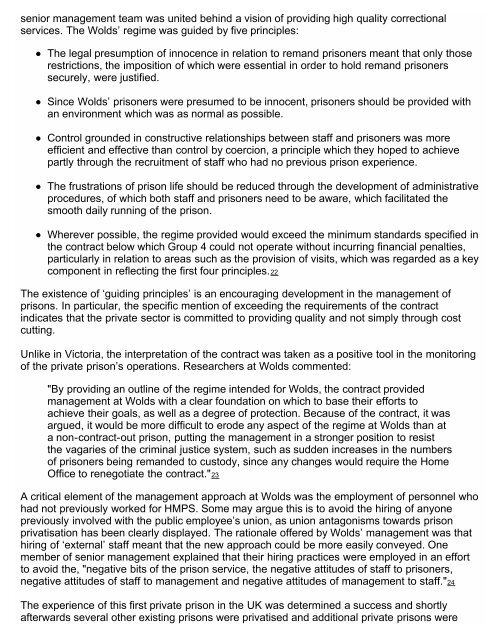prison privatisation in south africa issues, challenges and ...
prison privatisation in south africa issues, challenges and ...
prison privatisation in south africa issues, challenges and ...
Create successful ePaper yourself
Turn your PDF publications into a flip-book with our unique Google optimized e-Paper software.
senior management team was united beh<strong>in</strong>d a vision of provid<strong>in</strong>g high quality correctional<br />
services. The Wolds’ regime was guided by five pr<strong>in</strong>ciples:<br />
The legal presumption of <strong>in</strong>nocence <strong>in</strong> relation to rem<strong>and</strong> <strong>prison</strong>ers meant that only those<br />
restrictions, the imposition of which were essential <strong>in</strong> order to hold rem<strong>and</strong> <strong>prison</strong>ers<br />
securely, were justified.<br />
S<strong>in</strong>ce Wolds’ <strong>prison</strong>ers were presumed to be <strong>in</strong>nocent, <strong>prison</strong>ers should be provided with<br />
an environment which was as normal as possible.<br />
Control grounded <strong>in</strong> constructive relationships between staff <strong>and</strong> <strong>prison</strong>ers was more<br />
efficient <strong>and</strong> effective than control by coercion, a pr<strong>in</strong>ciple which they hoped to achieve<br />
partly through the recruitment of staff who had no previous <strong>prison</strong> experience.<br />
The frustrations of <strong>prison</strong> life should be reduced through the development of adm<strong>in</strong>istrative<br />
procedures, of which both staff <strong>and</strong> <strong>prison</strong>ers need to be aware, which facilitated the<br />
smooth daily runn<strong>in</strong>g of the <strong>prison</strong>.<br />
Wherever possible, the regime provided would exceed the m<strong>in</strong>imum st<strong>and</strong>ards specified <strong>in</strong><br />
the contract below which Group 4 could not operate without <strong>in</strong>curr<strong>in</strong>g f<strong>in</strong>ancial penalties,<br />
particularly <strong>in</strong> relation to areas such as the provision of visits, which was regarded as a key<br />
component <strong>in</strong> reflect<strong>in</strong>g the first four pr<strong>in</strong>ciples.22<br />
The existence of ‘guid<strong>in</strong>g pr<strong>in</strong>ciples’ is an encourag<strong>in</strong>g development <strong>in</strong> the management of<br />
<strong>prison</strong>s. In particular, the specific mention of exceed<strong>in</strong>g the requirements of the contract<br />
<strong>in</strong>dicates that the private sector is committed to provid<strong>in</strong>g quality <strong>and</strong> not simply through cost<br />
cutt<strong>in</strong>g.<br />
Unlike <strong>in</strong> Victoria, the <strong>in</strong>terpretation of the contract was taken as a positive tool <strong>in</strong> the monitor<strong>in</strong>g<br />
of the private <strong>prison</strong>’s operations. Researchers at Wolds commented:<br />
"By provid<strong>in</strong>g an outl<strong>in</strong>e of the regime <strong>in</strong>tended for Wolds, the contract provided<br />
management at Wolds with a clear foundation on which to base their efforts to<br />
achieve their goals, as well as a degree of protection. Because of the contract, it was<br />
argued, it would be more difficult to erode any aspect of the regime at Wolds than at<br />
a non-contract-out <strong>prison</strong>, putt<strong>in</strong>g the management <strong>in</strong> a stronger position to resist<br />
the vagaries of the crim<strong>in</strong>al justice system, such as sudden <strong>in</strong>creases <strong>in</strong> the numbers<br />
of <strong>prison</strong>ers be<strong>in</strong>g rem<strong>and</strong>ed to custody, s<strong>in</strong>ce any changes would require the Home<br />
Office to renegotiate the contract."23<br />
A critical element of the management approach at Wolds was the employment of personnel who<br />
had not previously worked for HMPS. Some may argue this is to avoid the hir<strong>in</strong>g of anyone<br />
previously <strong>in</strong>volved with the public employee’s union, as union antagonisms towards <strong>prison</strong><br />
<strong>privatisation</strong> has been clearly displayed. The rationale offered by Wolds’ management was that<br />
hir<strong>in</strong>g of ‘external’ staff meant that the new approach could be more easily conveyed. One<br />
member of senior management expla<strong>in</strong>ed that their hir<strong>in</strong>g practices were employed <strong>in</strong> an effort<br />
to avoid the, "negative bits of the <strong>prison</strong> service, the negative attitudes of staff to <strong>prison</strong>ers,<br />
negative attitudes of staff to management <strong>and</strong> negative attitudes of management to staff."24<br />
The experience of this first private <strong>prison</strong> <strong>in</strong> the UK was determ<strong>in</strong>ed a success <strong>and</strong> shortly<br />
afterwards several other exist<strong>in</strong>g <strong>prison</strong>s were privatised <strong>and</strong> additional private <strong>prison</strong>s were
















